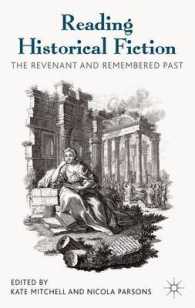Full Description
During the first half of the twentieth century, China saw sweeping changes in the material conditions and practices of communication, transforming the volume, velocity, variety, veracity, and value of information. Encountering the new abstract matter of information, a generation of Chinese writers faced a crisis of literary identity: What made literature distinct from other informational genres, such as newspaper columns, financial figures, and telegrams? How was the emergent information order reshaping individual and social knowledge? And where would literature stand within this new order?
This book examines how writers of the Republican era (1912-1949) came to recognize and respond to "information." Anatoly Detwyler investigates a wide range of literary and graphic experiments that engaged with different forms of information management, including data visualization, financial statistics, and propaganda science. These works, he argues, collectively attest to a new perceptibility of abstraction and its epistemological implications for apprehending reality. Tracing this mode of perception across fiction, poetry, and woodcut art, Seeing Through Abstraction offers a revisionist account of the development of modern Chinese literature and repositions it within the global history of the information age.
Contents
Acknowledgments
Note on Romanization and Translation
Introduction: Literary Encounters with Information in Modern China
1. "Distant Reading" and the Pull of Literary Abstraction in New Culture China
2. Piercing the Roar of Numbers: Misinformation and Fictitious Capital in Mao Dun's Market-Themed Literature
3. Ripple Effects: Ether and Information Order During the Propaganda Era
4. Narrating Networks: Shen Congwen's Literary Craft and the Social Life of Information
Conclusion: Seeing Through Abstraction
Appendix: Translations
Notes
Bibliography
Index








